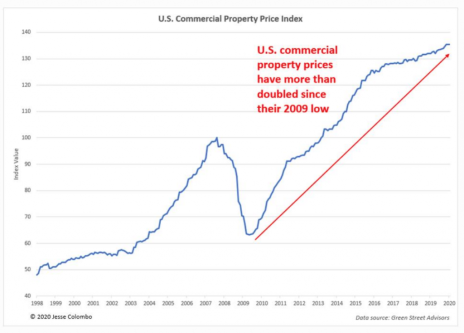Most of you are probably still working from home. Many of you probably don’t know when your company’s office will reopen. Some may never reopen. After years of soaring prices and ultra-low interest rates, the commercial real estate bubble has burst, with defaults popping up across the country thanks to COVID-19. Even in a surprising rally that’s now more than two months old, commercial real estate stocks still look untouchable.
Most of the bigger players in commercial real estate and the office space industry have not gotten off the mat the way other stocks have. Here’s how large-cap commercial real estate stocks have fared in the last few months:
[text_ad use_post='129632']
6 Sinking Commercial Real Estate Stocks
Boston Properties (BXP): -35% from its February peak
Simon Property Group (SPG): -52% from its January peak
CBRE Group (CBRE): -23% from its February peak
Welltower (WELL): -36% from its February peak
Realty Income Corp. (O): -26% from its February peak
Vornado Realty Trust (VNO): -39% from its January peak
Keep in mind that the S&P 500, as of this writing, is now just 9% off its February 19 all-time high.
Does that discrepancy make commercial real estate stocks undervalued? Not when you consider what’s happening out there.
Guggenheim is looking to cut office space by 50%. Former brick-and-mortar retail behemoths like J. Crew and Neiman Marcus have declared bankruptcy. Department stores, already on life support, are being dealt a final death blow – more than 50% of department stores in malls will close by 2021, according to Green Street Advisors.
Restaurants, bars, movie theaters, bowling alleys – most of them have been closed for nearly three months; some of them won’t be coming back.
There will be plenty of other big-name companies that decide, like Guggenheim, not to reopen many of their offices, having seen three months of evidence that their operations can work smoothly enough with their employees working remotely.
The costs of reopening offices is simply too high. Commercial property prices have more than doubled since the March 2009, post-recession low. Check out this 22-year chart, courtesy of Green Street Advisors’ Jesse Colombo:
While costs are sure to come down dramatically now, having an office may no longer be deemed worth the cost to Corporate America.
As for retailers, only the strong are likely to survive. And if popular clothing companies like J. Crew and Neiman Marcus are going broke, there are likely to be loads of other financial casualties that could not have been foreseen even three months ago.
Eventually, the economy will bounce back. Whether it takes another couple months of relative social distancing or another year, when there will presumably be a vaccine, is anybody’s guess. But it will bounce back. And so will demand for commercial real estate, though perhaps not to the degree of the halcyon days before coronavirus was a thing (i.e. five months ago).
Good REITs Still Out There
In the meantime, real estate investment trusts (REITs) as a group aren’t dead. Some buildings are essential. Our Tom Hutchinson, chief analyst of our Cabot Dividend Investor advisory, currently recommends a number of REITs – one that holds life science and research lab properties; one that owns considerable warehouse properties, where many of the items we’re ordering online these days are getting made; and one that’s in the marijuana industry (quite the high-demand industry in these stressful times!). Average return among those three niche REITs since Tom added them to his portfolios? 21.3%.
So while I wouldn’t invest in the large-cap commercial real estate stocks I listed above anytime soon, there’s still money to be made in commercial real estate if you invest in specific areas that have not only not been hurt by coronavirus, but are benefitting from it.
And to learn the names of the three REITs I just mentioned, click here.
[author_ad]


